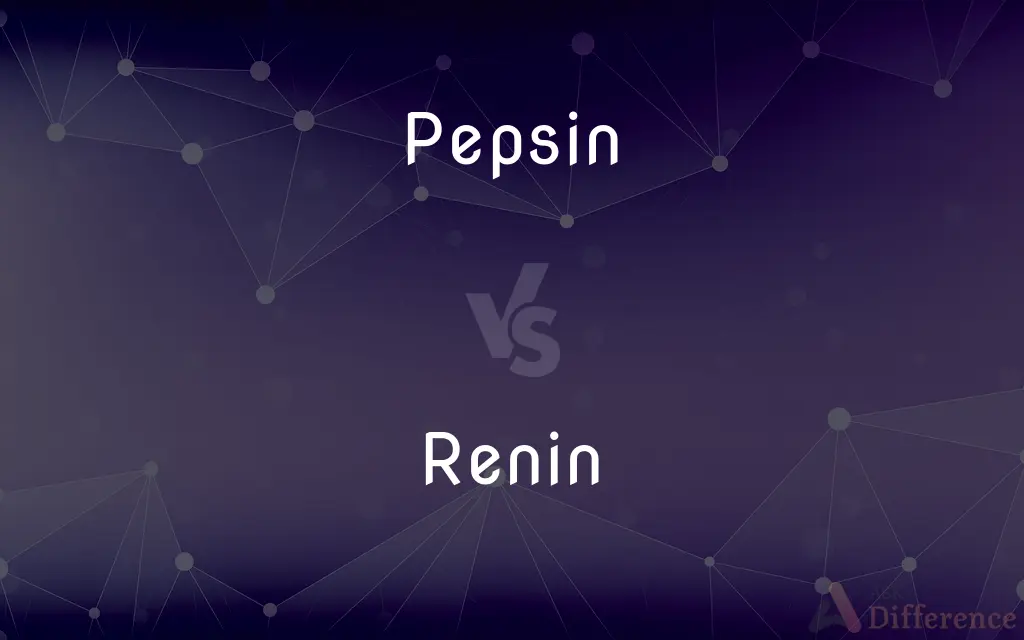Pepsin vs. Renin — What's the Difference?
By Urooj Arif & Maham Liaqat — Updated on April 15, 2024
Pepsin is a digestive enzyme breaking down proteins in the stomach, whereas renin is a hormone regulating blood pressure and electrolyte balance.

Difference Between Pepsin and Renin
Table of Contents
ADVERTISEMENT
Key Differences
Pepsin is an enzyme produced in the stomach that catalyzes the breakdown of proteins into peptides, facilitating digestion. In contrast, renin is an enzyme secreted by the kidneys that functions as a hormone in the renin-angiotensin-aldosterone system, crucial for regulating blood pressure and fluid balance.
Pepsin begins its action in the acidic environment of the stomach, specifically targeting peptide bonds in proteins. On the other hand, renin acts by converting angiotensinogen, a plasma protein made by the liver, into angiotensin I, which is then further processed to affect vascular resistance and sodium balance.
The production of pepsin is stimulated by the presence of food in the stomach and by gastric acid secretion. Whereas, renin secretion is triggered by a decrease in blood pressure, blood volume, or blood sodium levels, detected by the kidneys.
While pepsin plays a direct role in the digestive process, aiding in nutrient absorption by breaking down proteins, renin indirectly influences kidney function, sodium retention, and potassium excretion, impacting overall fluid and electrolyte homeostasis.
Both pepsin and renin are essential in their respective systems; however, their dysfunction can lead to different health issues—pepsin imbalance can contribute to ulcer formation, while renin abnormalities can lead to hypertension or disorders like renal artery stenosis.
ADVERTISEMENT
Comparison Chart
Function
Digestive enzyme
Hormone (part of an enzyme system)
Primary Action
Breaks down proteins into peptides
Regulates blood pressure and fluids
Location of Action
Stomach
Bloodstream
Stimulus for Production
Presence of food and gastric acid
Low blood pressure/volume, low sodium
Health Implications
Peptic ulcers, indigestion
Hypertension, kidney diseases
Compare with Definitions
Pepsin
A digestive enzyme that breaks down proteins in the stomach.
Pepsin is crucial for the digestive process, aiding in nutrient breakdown.
Renin
A hormone involved in the regulation of blood pressure.
Renin adjusts blood pressure in response to various physiological triggers.
Pepsin
Produced in the stomach lining.
The gastric glands secrete pepsin as a response to eating.
Renin
Part of the renin-angiotensin-aldosterone system.
Renin initiates a cascade that controls blood pressure and fluid balance.
Pepsin
Activated by stomach acidity.
Pepsin requires an acidic pH to function effectively.
Renin
Linked to cardiovascular and renal health.
Abnormal renin levels can lead to hypertension or renal conditions.
Pepsin
Essential for protein digestion.
Without pepsin, protein digestion would be significantly impaired.
Renin
Secreted by the kidneys.
The juxtaglomerular cells in the kidneys produce renin.
Pepsin
Associated with digestive health.
Excessive or deficient pepsin production can affect overall digestion.
Renin
Influences electrolyte balance.
Renin activity can affect potassium and sodium levels in the body.
Pepsin
Pepsin is an endopeptidase that breaks down proteins into smaller peptides. It is produced in the gastric chief cells of the stomach lining and is one of the main digestive enzymes in the digestive systems of humans and many other animals, where it helps digest the proteins in food.
Renin
Renin (etymology and pronunciation), also known as an angiotensinogenase, is an aspartic protease protein and enzyme secreted by the kidneys that participates in the body's renin–angiotensin–aldosterone system (RAAS)—also known as the renin–angiotensin–aldosterone axis—that mediates the volume of extracellular fluid (blood plasma, lymph and interstitial fluid) and arterial vasoconstriction. Thus, it regulates the body's mean arterial blood pressure.
Pepsin
A digestive enzyme found in gastric juice that catalyzes the breakdown of protein to peptides.
Renin
An enzyme released by the kidneys that cleaves a plasma protein to produce an inactive form of angiotensin which is then converted to an active form that raises blood pressure.
Pepsin
A substance containing pepsin, obtained from the stomachs of hogs and calves and used as a digestive aid.
Renin
(enzyme) A circulating enzyme released by mammalian kidneys that converts angiotensinogen to angiotensin I. Due to its activity which ultimately leads to the formation of angiotensin II and aldosterone, this hormone plays a role in maintaining blood pressure.
Pepsin
(enzyme) A digestive enzyme that chemically digests, or breaks down, proteins into shorter chains of amino acids.
Renin
A proteolytic enzyme secreted by the kidneys; catalyzes the formation of angiotensin and thus affects blood pressure
Pepsin
A proteolytic enzyme (MW 34,500) contained in the secretory glands of the stomach. In the gastric juice it is united with dilute hydrochloric acid (0.2 per cent, approximately) and the two together constitute the active portion of the digestive fluid. It degrades proteins to proteoses and peptides, and is notable for having a very low pH optimum for its activity. It is the active agent in the gastric juice of all animals.
Pepsin
An enzyme produced in the stomach that splits proteins into peptones
Common Curiosities
Can the malfunction of pepsin affect health?
Yes, an imbalance in pepsin can lead to digestive issues such as peptic ulcers or indigestion.
Is pepsin activity similar in all people?
Pepsin activity can vary based on factors like stomach pH levels and the individual's overall digestive health.
What triggers the release of renin from the kidneys?
Renin release is triggered by reduced renal blood flow, decreased sodium concentration, or lowered blood pressure.
How is pepsin production regulated?
Pepsinogen, the precursor to pepsin, is secreted by the stomach and activated by gastric acid.
What role does pepsin play in digestion?
Pepsin primarily breaks down proteins into smaller peptides, facilitating nutrient absorption in the intestine.
What are the effects of high renin levels?
High renin levels can lead to hypertension and contribute to the risk of heart disease.
Are there any diseases specifically related to pepsin dysfunction?
Conditions like gastroesophageal reflux disease (GERD) and peptic ulcer disease can be associated with pepsin dysfunction.
How does dehydration affect renin levels?
Dehydration can trigger increased renin secretion as the body attempts to conserve water and sodium.
What dietary considerations affect pepsin production?
Diets high in protein can increase pepsin production, as more enzyme activity is required for protein digestion.
How does renin contribute to blood pressure control?
Renin regulates blood pressure by initiating a chain reaction that increases arterial constriction and sodium retention.
Does renin have any direct actions besides its role in blood pressure?
While primarily affecting blood pressure, renin also impacts kidney function and electrolyte management.
Can renin production be influenced by medication?
Yes, several types of blood pressure medications, such as ACE inhibitors and beta-blockers, can affect renin production.
What symptoms indicate a problem with pepsin levels?
Symptoms like frequent heartburn, stomach discomfort, and poor digestion can indicate pepsin issues.
What measures can help regulate renin levels naturally?
Maintaining adequate hydration, regular exercise, and a balanced diet can help regulate renin levels.
What tests are used to measure renin or pepsin dysfunction?
Blood tests can assess renin activity and levels, while specific gastric tests might be used to evaluate pepsin function.
Share Your Discovery

Previous Comparison
Called vs. Named
Next Comparison
Condition vs. WarrantyAuthor Spotlight
Written by
Urooj ArifUrooj is a skilled content writer at Ask Difference, known for her exceptional ability to simplify complex topics into engaging and informative content. With a passion for research and a flair for clear, concise writing, she consistently delivers articles that resonate with our diverse audience.
Co-written by
Maham Liaqat














































